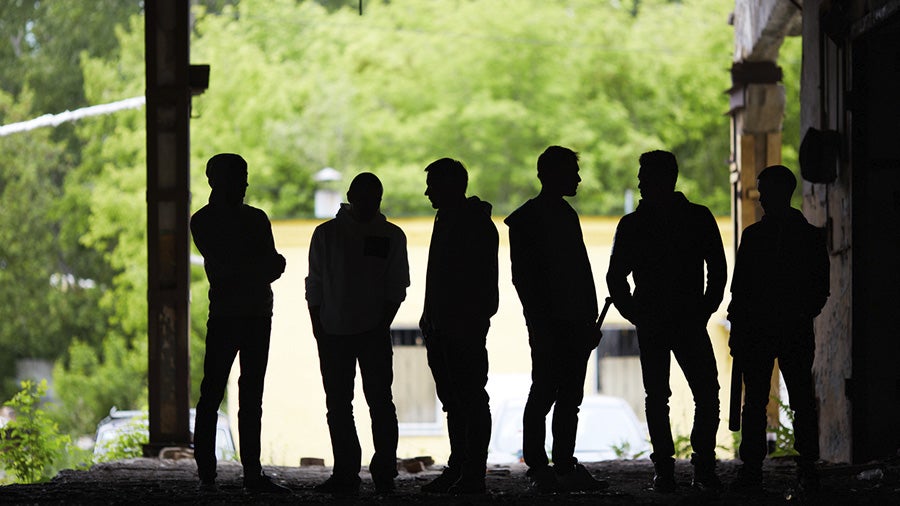Country Focus
Belize
Belize steps up to prevent youth violence

Jared Cain, 18, from the south side of Belize City, Belize, knows all too well the sound of gunshots. "In the past two to three weeks alone, there’s been multiple shootings in my neighborhood," says Cain, a member of the Belize Children’s Advisory Body and the Belize Family Life Association Youth Advocacy Movement. "It’s common to hear gunshots outside my window while I’m studying or playing video games with friends."
Violence, particularly homicide, sexual violence and bullying, is a significant adolescent health issue in Belize. Teenage boys are more likely to drop out of school and become involved with violent gangs or other illegal activities.
"We shouldn’t worry about the grown men holding their guns,” Cain says. “We should be focusing on ways to get guns out of the hands of youth in our country."
Setting the national adolescent strategy
Although 1 in 5 people in Belize is aged 10-19 years, adolescents are underserved by the country’s health programs. In addition to violence, adolescents have high rates of teen pregnancy, sexually-transmitted diseases, road traffic injuries, obesity and depression.
While interventions like free contraception and sexuality education are available, adolescents in Belize either do not access the services, face stigma or shame, or are not provided enough information. Violence prevention programs have not achieved the scale and intensity to achieve impact. Mental health and counseling services are largely unavailable.
To improve the situation, the Pan American Health Organization/World Health Organization (PAHO/WHO) is working with the Belize Ministry of Health, UNICEF, UNFPA, and other stakeholders to develop a national adolescent health strategy that targets all health challenges holistically, rather than focusing on one or two.
"Adolescents are facing numerous health challenges that are impacting their ability to thrive and reach their full potential,” said Julio J Sabido, Medical Officer, Maternal and Child Health, Belize Ministry of Health. “Investing in adolescents will have immediate and long-lasting impact on their health, and that of future generations."
AA-HA!
Belize is one of the first countries to translate the Global Accelerated Action for the Health of Adolescents (AA-HA!): Guidance to support country implementation, launched by WHO in 2017, into a national plan. The AA-HA! Guidance details various interventions, such as comprehensive sexuality education or policies to limit access to firearms, that countries can implement as part of their national plans.
In order to draft a preliminary roadmap and fully understand the process, a delegation from Belize participated in an AA-HA! Guidance meeting for Caribbean countries in November 2017. Four months later, the Ministry of Health held the first stakeholder meeting to introduce the roadmap and propose a workplan for developing the national strategy.
Consultations with additional local and national stakeholders are now being conducted to gather further input. The country plans to launch their first national adolescent health strategy by December 2018.
"It is essential that we have a wide consultation of stakeholder groups so that our national strategy does not only relay national-level priorities, but also those at the community level," said Susan Kasedde, UNICEF Belize Representative.
Belize is one of eight Caribbean countries to participate in the November AA-HA! training organized by PAHO/WHO and partners. Since then, Guyana, Suriname, and St. Vincent have also moved forward with development or revision of their adolescent health plans or strategies. An AAHA! orientation workshop was also organized for eight states in Brazil.
“The AAHA! has really helped accelerate strategic planning for the health of adolescents in the Region, aligned with the Sustainable Development Goals and the Global Strategy for Women’s, Children’s and Adolescent Health,” said Sonja Caffe, regional advisor on Adolescent Health at PAHO. “Its step-by-step guidance for setting of national priorities helps countries translate these priorities into plans and programs.”
Barbados was the first country in the Region to apply the AAHA! guidance in October 2017, becoming one of the early adopter countries at the global level. In March of 2018, another AA-HA! training workshop was held for national teams in Latin America, with participation from more than nine countries. Haiti will also revise and update their national adolescent health plan in May, using AA-HA! guidance.
Ensuring adolescent voices are heard
Meaningful adolescent and youth engagement is also critical to the design, implementation and ownership of Belize’s adolescent health strategy. UNICEF will support 130 adolescent representatives from the Children’s Advisory Bodies operating in municipalities nationwide, to join other stakeholders in informing the development of the strategy.
"We are very conscientious that the country cannot develop a impactful adolescent health strategy without the voices of its youth," said Sabido. "We need all of their perspectives to develop a plan that will positively impact their health and wellbeing."
Lezli McCulloch, 18, is one of the youth advocates lending her voice to the plan. Having seen the stigma teenage girls face when they become pregnant, and learned very little about sexual and reproductive health in school, McCulloch hopes the strategy will offer adolescents in the future more resources.
"I want to see better services provided to adolescents, especially services that help to reduce gun violence and teen pregnancy,” she says. “We have been affected for too long and too many lives have been lost. There should be more for us."